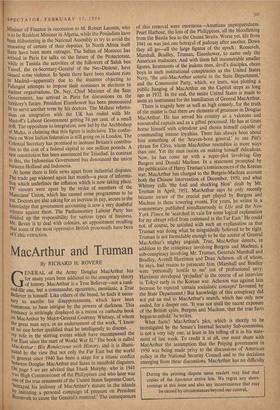Portrait of the Week
THE cold has been international this week. There have been disastrous avalanches in Yugoslavia, the Spanish orange crop has been ruined, and US transport aircraft have been parachuting supplies into Italian villages. In Britain there have been the blocked roads and interruption of services usual in a country which suffers from, but never expects, an annual cold spell. In Moscow's seventy degrees of frost the delegates to the twentieth Congress of the Soviet Communist Party will, no doubt, have been kept warm by the hot air to which they were treated by M. Khrushchev in his speech on Tuesday. While expressing a desire for closer relations between Russia and Britain, he appeared to regard the latter as some- thing of a wasting asset and drew a grisly picture of the capita- list world fading away from sheer inanition. He said that the three major problems, the solution of which 'can create a basis for stable and lasting peace.' were collective security in Europe. collective security in Asia and disarmament. Co-existence is obviously still continuing, though many other people seem to have thought of these problems before M. Khrushchev. He also offered to end hydrogen bomb tests, if the West would too.
The Party Congress was preceded by the reappearance of the vanishing diplomats, Maclean and Burgess, now playing the part of fugitives from the Special Branch. There has been speculation as to the motives which prompted the USSR to produce them, but one thing seems certain : even their Soviet bosses can hardly regard them as the noble fellows they make themselves out to be. Mr. Selwyn Lloyd threw diplomatic prudence to the winds in the House of Commons and positively referred to Russian 'lack of candour' regarding this case.
The cold war, then, continues. In the Middle East, which seems to be its main theatre at the moment, this week has seen a statement issued by the Russian Foreign Ministry warning Britain and America not to try armed intervention, which would be 'a crude violation of the UN Charter.' This was probably a rejoinder to the communique issued after the Washington talks, but may refer to the possibility of British intervention in Jordan under the treaty between the two countries. Meanwhile, Soviet arms keep arriving in Egypt, Russia is to help the Egyptians to set up their first atomic research laboratory, and the World Bank and the Egyptian Government have agreed on the financing of the Aswan dam.
In France M. Mollet has appointed M. Ramadier as Minister of Finance in succession to M. Robert Lacoste, who IS to be Resident Minister in Algeria, while the Poujadists have been filibustering in the National Assembly to try to avoid the unseating of certain of their deputies. In North Africa itself there have been more outrages. The Sultan of Morocco has arrived in Paris for talks on the future of the Protectorate, while in Tunisia the activities of the followers of Salah ben Yussef, the ex-Secretary-General of the Neo-Destour, have Faused some violence. In 'Spain there have been student riots in Madrid—apparently due to the students objecting to ralangist attempts to impose their nominees in elections to student organisations. Dr. Ney, Chief Minister of the Saar Government, has arrived in Paris for discussions on the territory's future. President Eisenhower has been pronounced fit to serve another term by his doctors. The Maltese referen- dum on integration with the UK has ended with Mr. Minton Labour Government getting 74 per cent. of a small Poll. The opposition to integration, now led by the Archbishop of Malta, is claiming that this figure is indecisive. The confer- ence on West Indian federation is still going on in London. The Colonial Secretary has promised to increase Britain's contribu- tion to the cost of a federal capital to one million pounds. A new constitution has been announced for Trinidad. In contrast to this, the Indonesian Government has denounced the union between Holland and Indonesia.
At home there is little news apart from industrial disputes. The trade gap widened again last month—a piece of informa- tion which underlines the inflation which is now taking place. TV viewers were upset by the strike of members of the Musicians' Union, which has caused some programmes to be out. Doctors are also asking for an increase in pay, secure in the knowledge that government accounting is now a very doubtful witness against them. The Parliamentary Labour Party has divided up the responsibility for various types of business. Mr. Bevan is to deal with colonies, an appointment recalling that some of the most oppressive British proconsuls have been Of Celtic extraction.



































 Previous page
Previous page